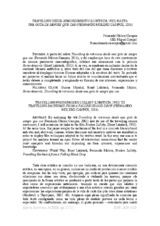Travelling desde Remordimiento (Lubitsch, 1932) hasta Una gota de sangre que cae (Fernando Molero Campos, 2011)
Travelling from Broken lullaby (Lubitsch, 1932) to Travelling backward from a falling blood drop (Fernando Molero Campos, 2011)
Autor
Molero Campos, Fernando
Editor
UCOPressFecha
2020Materia
Guerra MundialLubitsch, Ernst, 1892-1947
Molero Campos, Fernando, 1965-
Remordimiento
Travelling de retroceso desde una gota de sangre que cae
World War
Broken Lullaby
Travelling Backward from a Falling Blood Drop
METS:
Mostrar el registro METSPREMIS:
Mostrar el registro PREMISMetadatos
Mostrar el registro completo del ítemResumen
A partir del relato Travelling de retroceso desde una gota de sangre que cae (Fernando Molero Campos, 2011), y del empleo que hace de este movimiento de cámara puramente cinematográfico, señalaré sus conexiones con la película Remordimiento (Ernst Lubitsch, 1932). A su vez, se sondeará su inclusión dentro de la corriente literaria antibélica y, sobre todo del cine del que toma discursos y motivos narrativos al desplegar técnicas fílmicas adaptadas a la escritura del texto. Se pretende así proyectar el análisis hacia un futuro abierto de vinculaciones intertextuales que el lector deberá ir completando y ampliando en función de sus intereses, experiencias y conocimientos. By analyzing the tale Travelling de retroceso desde una gota de sangre que cae (Fernando Molero Campos, 2001) and its use of the travelling camera movement, I will scrutinize its links to the film Broken Lullaby (Ernst Lubitsch, 1932). At the same time, this paper weighs the inclusion of the text in a concrete literary trend anti-war and, above all, cinema, whose discourse and narrative motives are absorbed in order to deploy film techniques adapted to the written word. In this way, our aim is to project the analysis toward an open future of intertextual connections that the reader must complete and broaden out depending on their interests, experiences and knowledge.

